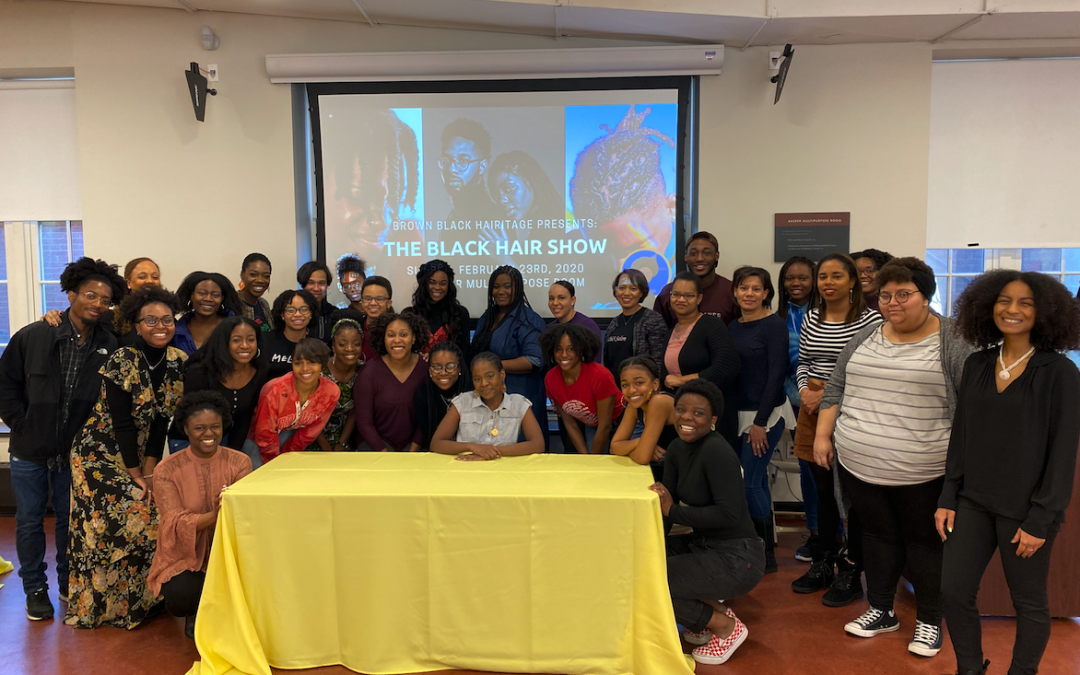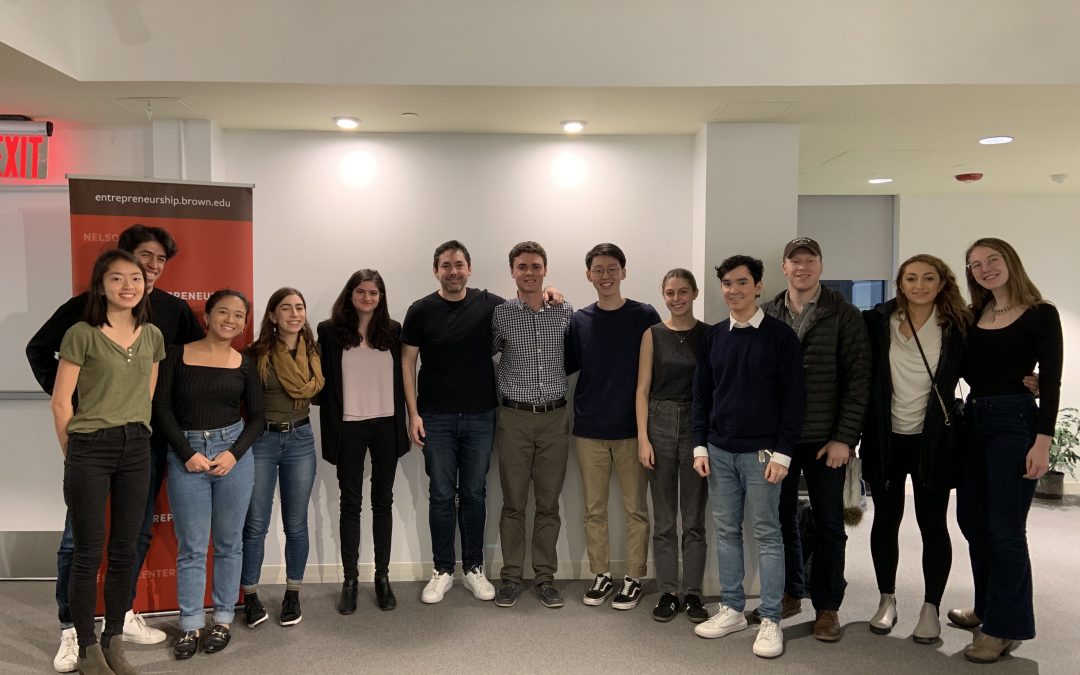by Sheila Haggerty | Mar 20, 2020 | Student Experience
We are excited to continue Brown EP’s (our student club) #MakeItHappen tradition, with a story from Brown EP leaders! Chuck Isgar ‘21, Megan Kasselberg ‘20 and David Lu ‘20 came together this past week and came up with a solution to help keep students and startups connected. These students recognized that early-stage startups might be restricted in hiring or having difficulty completing projects. They started Intern From Home, connecting students to virtual internships during COVID-19.
Continue reading to learn more about program and message from the student leaders:
During this uncertain time, we know that your company may be restricted in hiring and having difficulty completing tasks that you’ve had on your agenda for the upcoming weeks. We have a solution for you!
Intern From Home presents an opportunity for you to offer project-specific virtual internships to highly skilled college students who are a strong fit for the role within 24 hours of the role being posted. Internships can be paid or unpaid, and any length of time. Intern From Home has hundreds of students from Brown, Harvard, and many more top schools, seeking internships. To submit a role, please fill out this form and the role will be posted shortly thereafter. Feel free to submit more than one role; simply fill out a form for each role you are offering: https://forms.gle/b4xonZsyAgMpBThE8.
How Intern From Home works:
1.) You fill out this form with details about the role.
2.) The role gets posted on Intern From Home’s website and sent to candidates who might be a strong fit; candidates apply.
3.) Intern From Home vets all of the applications and sends the top 5 matches to you within 24 hours of the role being posted.
4.) Conduct your process for interviewing and make an offer to the best-fit candidate(s).
Please note that Intern From Home charges no commission from you or the student intern. This free platform is all about helping you fill roles and complete tasks that might otherwise be challenging during this time, as well as offering accomplished college students the opportunity to gain valuable experience and effectively use their newfound free time following their school’s shift to virtual classes.
Thank you very much for considering submitting a role. If you’re passionate about what we’re trying to do, we ask that you please share the link with anyone whom you think might benefit from it (ie: other startups you know, etc.). If you have any questions, please feel free to reach out to team.internfromhome@gmail.com.
The Nelson Center for Entrepreneurship wants to learn about your creative ideas, your startups, and your solutions on how we can stay connected. We will use inspiring hashtag #MakeItHappen, and we encourage you to use it as well. Fill out this short form and we will do our best to share via our various communication platforms.

by Tori Gilbert | Mar 11, 2020 | Student Experience
Written by Lauren Brown ’22
On February 23, the Brown Black Hairitage group hosted its first annual Black Hair Show. Club leaders Alexis Newell ’20, Pauline Wakudumo ’20, Lauren Brown ’22, Abigail Wesson ’23, and Kira Dubose ’22 invited students, faculty, stylists, and community members to celebrate the societal impact of Black hair. The five hour show featured roundtable discussions with local hair influencers, stylist demonstrations, and personal hair consultations for students.
Brown Black Hairitage was founded in 2017 by Alexis Newell ’20. The organization’s mission was and is to create space for discussion and collaboration around the topics of how Black hair is integrated into the fabric of the workplace, academia, and popular culture. The group meets twice a month to hold roundtable discussions, hair workshops, and screenings for media centered around hair.
The roundtable discussion featured Shahidah Ali, Rodlyne Louis, and Kerlyne Jean-Baptiste ’16. Ali is the former owner of Mixx Beauty hair salon which now focuses its efforts on producing various hair and beard products for salons and individuals. Louis runs the BeauEssence salon on North Main Street, catering to natural hair. Along with the salon, BeauEssence has hair products for natural, textured hair. Jean-Baptiste ’16 is the founder of KerlyGirl: a hair care line that aims to make plant based products for natural hair more accessible and affordable. During the session, these hair entrepreneurs discussed their own journeys through the business side of the beauty industry. Attendees asked these hair experts for advice regarding their own hair during the Q&A portion of the discussion.
The remainder of the event featured Kyle Pereira from DaPoint barber shop and Miguelina Liberato from 1263 Salon. Students received complimentary haircuts and blowout styles from these stylists and Jasmine Cardichon ’22 provided students with cornrow styles as well. Attendees left the event with a bundle of free samples from natural haircare brands including the Traces Ellis-Ross ’94 line Pattern Beauty.
To learn more about Brown Black Hairitage read this Brown Alumni Magazine’s article and fill out this interest form to see what you can do to expand BBH’s impact on campus and around in the world!


by Tori Gilbert | Mar 3, 2020 | Alumni Stories, Roundtable Recap
By Chuck Isgar ‘21
On February 7, 2020, The Nelson Center for Entrepreneurship and Brown EP hosted Charlie Kroll ‘01 for a roundtable discussion as part of the Roundtable Discussion Series moderated by Chuck Isgar ’21. Kroll shared stories and lessons learned from the process of founding and building Andera and Ellevest, companies focused on financial technology.
Beginning Andera as a student at Brown
Kroll attended Brown in the late 90’s, around the time of the dot com bubble. He was on his way to Wall Street, but a unique situation set him onto another track. As a student, Kroll had been running his own web design business. He entered a business plan competition, and while he didn’t win, his mentor, Steve Siegel, ScM ‘83, PhD ‘85 offered to be an investor. Kroll said “let’s do it.”
The web design business pivoted into Andera which provided an instant solution for banks to allow customers to fill out forms when opening checking accounts. Technology like this was very new to banks at the time. Kroll described the interesting process of selling this new concept: “nobody bought it, but everyone wanted to talk about it.”
Capturing a timely opportunity in the financial services industry
Kroll admitted that much of the success of Andera stemmed from the unique timing at which the business was expanding. Leading up to 2008, there was lots of excess in the financial system, and since banks needed deposits to fund loans, Andera was uniquely positioned to help the banks quickly open accounts for customers.
Andera survived the financial crisis fairly well and the growth continued. After expanding to over 100 employees, 3 offices, and 600 financial institution customers, Andera was acquired by Bottomline Technologies (NASDAQ: EPAY) in April 2014 for $48 million.
The inspiration for Ellevest
Kroll took some time off after the acquisition of Andera, but he knew he wanted to start something new in fintech. He shared with our group of students that as he was trying to determine what his next venture would be, he was asking himself: “what is the next 10 year shift and what role can I play in it?”
He saw financial advising as having been the same for many years, and he wanted to be around people innovating in investing. Charlie came to know Sallie Krawcheck, previously CEO of Smith Barney, CFO of Citigroup, global head of wealth management for Citigroup, President of Merrill Lynch, and considered one of the most successful women in Wall Street history.
Both having extensive experience in the financial industry, they started Ellevest with a question: why is it that men and women have different behaviors in investing? Most notably, they knew that women don’t invest as much as men, and they saw an opportunity to help women.
The emphasis on thorough testing when building Ellevest
Before beginning to actually build Ellevest, Kroll and Krawcheck had lots of hypotheses to test. After six months of diving deep into research and customer testing, they began to narrow in on who exactly their target users would be. Their initial target was mid-career professional women aged 28 to 35. To this day, they continue to focus on a target persona, which they call Elle.
There were tens of thousands of women interested in Ellevest before the launch. According to Kroll, they spent nine months just going through the waitlist, a time during which they would test out features with different segments of users.
Growing Ellevest: a continued focus on females
Ellevest officially launched in November of 2016. The company initially was pulled up market, but they are now going down market and figuring out how to best serve a wider audience.
In terms of the competitive landscape, Kroll shared that Ellevest competes with many other platforms, but also none at the same time since no one else is focused exclusively on women. When asked whether Ellevest would ever expand into the male audience, Kroll was clear to say that their focus is women.
There is strong reason to think that the focus is working. Ellevest has has been named on CNBC’s Top 50 “Disruptor” List, #14 on LinkedIn’s 50 “Hottest Startups To Work For” (and #2 in New York), and one of Entrepreneur Magazine’s Top 100 Brilliant Ideas.
Going forward, Ellevest is aiming to be more involved in banking. Their vision is that you start banking with Ellevest, and then realize that you can invest sooner than you thought.
The importance of diversity at Ellevest
Diversity is very important at Ellevest. The company places an emphasis on diversity of thought and point of view. The team is diverse, but they are all bound around Ellevest’s core mission of helping women invest. Kroll shared that having a team motivated by the company’s mission is such an important asset to the company.
Kroll’s advice for students on their journey in entrepreneurship
For the student entrepreneurs in the room, Kroll provided advice about the research phases of beginning a startup. He encouraged the student entrepreneurs in the room to focus on doing hands-on prototyping and user research. Kroll emphasized the importance of conducting your own user research as opposed to reading research reports.
Students at our discussion were curious to hear Kroll’s advice about what to look for when thinking about interning or working at a startup. He provided two core questions to consider as you think about joining a startup: Are you inspired by the people at the company? Importantly, do you respect the people with whom you would be working? In addition, he recommended seeing if you have an interest in the subject matter or industry of the startup.
Kroll left students not just with specific advice, but also inspiration. The inspiration that someone who lost a pitch competition could go on to turn an idea into a $48 million business. Inspiration about how to think about the future of an industry. Inspiration about how to use detailed research to create the best product for people. And importantly, inspiration about how a company can focus on a specific market in order to make people’s lives better.


